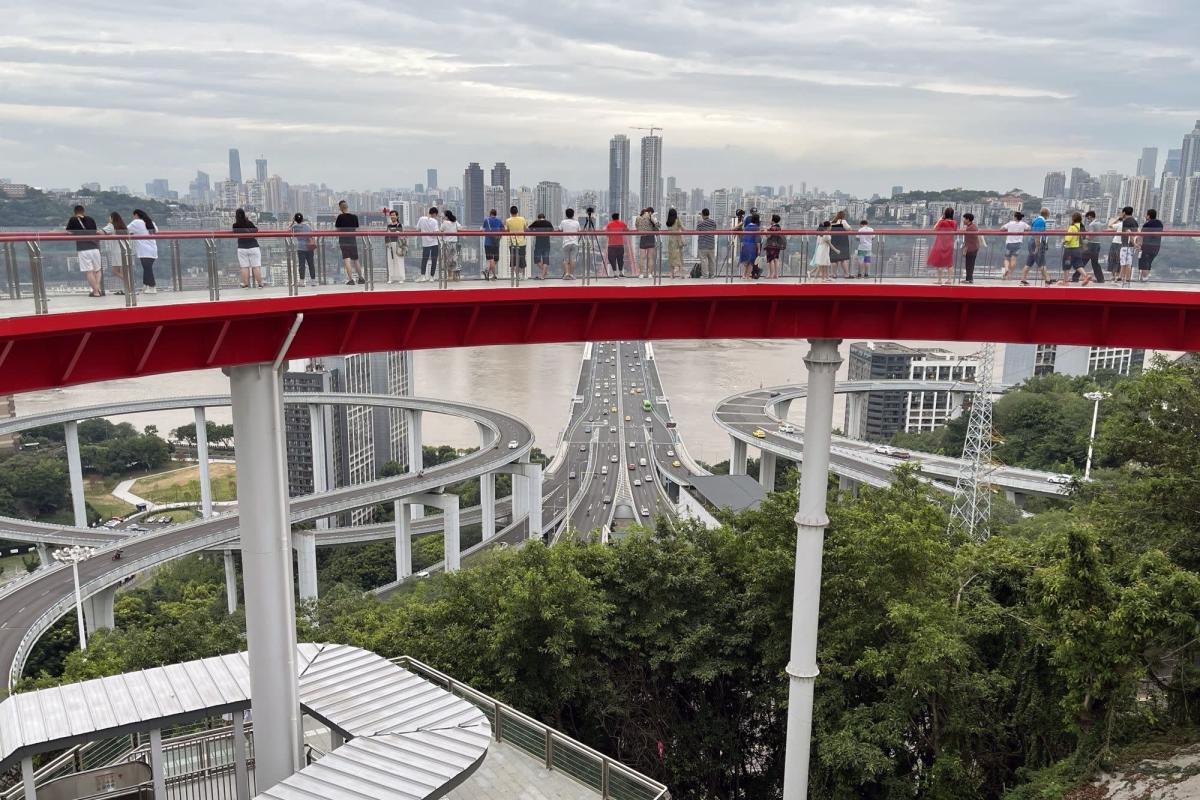
(Bloomberg) — President Xi Jinping’s Covid Zero strategy has become notorious internationally for its grueling lockdowns. But in the southwestern megacity Chongqing, signs of China’s signature pandemic policy disrupting daily life are hard to find.
Most Read from Bloomberg
Tourists snapped selfies at an ancient fortress while hundreds of partygoers packed into a gay bar this week, with barely a mask in sight. Ride-hailing-app users hopped into Didi Global Inc. cars to escape the city’s 40-degree Celsius (104 Fahrenheit) heat wave without scanning contact-tracing apps, unlike in Beijing. Domestic travelers poured into the city, which mostly doesn’t require quarantine on arrival.
Chongqing has logged just 165 cases of Covid since February 2021, the fourth-lowest of any province — the manufacturing hub twice the size of Switzerland counts as its own municipality, as do only Beijing, Shanghai and Tianjin. The city hasn’t seen a major lockdown since early 2020, even as Beijing and Shanghai stay on high alert and more than 28 million people are living under citywide restrictions as of Monday, according to Bloomberg’s Lockdown Tracker.
Thus, tourists continue to flock to Chongqing, to soak in its shimmering skyline, spicy hot pot and history as China’s capital during World War Two. And the city isn’t unique. Across China, many cities are business as usual, as the ruling Communist Party’s border curbs, mass testing drives and lockdowns stop the virus from a cross-country spread — the nation of almost 1.4 billion reported just over 600 cases Tuesday.
That relative normalcy has enabled Xi to press ahead with his Covid Zero strategy as the rest of the world moves on, even in a landmark political year when he’s seeking a precedent-breaking third term in power. Protests like those seen in Shanghai earlier this year, while notable for their open dissent, are still rare.
“As long as you have a majority of the population still living a normal life and not being affected by the pandemic, that will justify the continuation of the Zero Covid policy,” said Huang Yanzhong, a senior fellow for global health at the New York-based Council on Foreign Relations.
That shelter from Covid Zero’s harshest tenets could be shattered overnight by a sudden spike in cases, Huang added. In that scenario, officials will resort to the “heavy-handed Covid Zero measures” seen in Shanghai, he said.
China’s push to eliminate Covid makes even domestic travel onerous, with different provinces and cities setting their own rules, often stipulating a litany of testing and quarantine requirements to fulfill. Predictions for the nation’s overall growth have fallen to 4%, as Covid controls drag on the wider economy.
Chongqing, by contrast, is a “small paradise,” said Nicola Sangiovanni, a local resident and chef at Italian restaurant, Suliven, in a central business district. The eatery relies on out-of-towners for more than half its customers in summer months. Covid restrictions “don’t have a strong impact on tourists when they come here,” he added, noting an uptick in arrivals in recent weeks.
Travelers to Chongqing must download the city’s health code app, and show a negative Covid test taken within 48 hours. Those entering from cities with medium- or high-risk areas should take two PCR tests within three days of arrival — a fairly easy requirement with testing booths across the city. Only those coming directly from higher risk areas must quarantine.
One Chongqing executive said the city’s attraction was simple. “People come to Chongqing because they can,” said the man, who asked only to be identified by his surname, He, when speaking about political matters. “Chongqing’s approach is more people-friendly,” he added.
Kelen Leong, general manager of Raffles Hospital in Chongqing, which opened in early 2019 as the city’s first private international hospital, said she had noticed an easing of entry rules.
“This time coming back to Chongqing, they were much more relaxed,” she said, noting she wasn’t even asked to scan her health code at some check points on returning from Shanghai earlier this month, unlike when reentering from Kunming, in Yunnan province, a few months earlier.
Last week, Chongqing hosted the Western China International Fair for Investment and Trade, which organizations from 38 countries and regions attended signing 240 billion yuan ($35.5 billion) of deals, according to the official Xinhua News Agency. “Maybe this time they feel they have to relax the rules to get people to come in,” Leong said.
The lack of lockdowns has helped Chongqing avoid the economic travails of its peers in recent months. The local economy grew 2.9% year on year in the second quarter, compared with a 0.7% increase Tianjin and declines in Beijing and Shanghai.
On a lively backstreet neighborhood in Chongqing, lunchtime diners tucked into the nation’s latest food craze: zhimu shengjian bao, a bowl of small, fried dumplings, resting atop a flavored ice drink.
The ability to sample China’s culinary innovations could abruptly come to a halt if the Covid situation shifts. Chongqing has recorded at least two cases in downtown areas with lots of tourists in recent weeks. Sporadic infections have been logged on the city’s outskirts almost every day for the past week.
Meanwhile, the neighboring city of Chengdu, known for its vibrant startup scene and buzzing nightlife, is currently under widespread restrictions, after finding more than 100 cases in the past week.
Chong Ja Ian, an associate professor at the National University of Singapore’s political science department, said Shanghai was also operating under “normal and acceptable” conditions until earlier this year — and its government also had a more liberal and targeted approach to sporadic cases. But the more infectious omicron variant sent Shanghai into a months-long lockdown and a cycle of mass testing it is still struggling to recover from.
Despite that lingering threat, in Chongqing, an air of bravado prevails. Wang Yuanling, an art curator, ascribed that to city residents’ optimism.
“When the city was bombed during the World War II, Chongqingers were able to emerge from the air-raid shelters and go on with their lives,” he said.
“Such is the spirit of the city,” he added. “We have adapted and found our ways to deal with Covid.”
Most Read from Bloomberg Businessweek
©2022 Bloomberg L.P.




